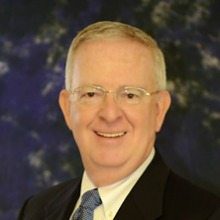
Tom Burden knows a thing or two about the Healthcare industry. Before becoming Principal and COO of Potomac Healthcare Solutions, a company he co-founded in 2011, Burden spent 23 years with Navy Medicine, eight years with PHP Healthcare Corporation and 10 years with health services firm CRAssociates. As a Navy Medical Service Corps Officer, Burden served on the staff of the Navy Surgeon General, and while at PHP, he managed numerous health services delivery contracts. He served as Executive VP at CRAssociates and contributed to the company’s growth as well as led business development, program implementation and more.
Since founding Potomac Healthcare Solutions, Burden and co-founder Bill Joseph, implemented and operated an award-winning Army primary care clinic contract, which earned the company its 2012 Government Project of the Year Award from SECAF. Burden recently spoke to WashingtonExec about his company’s award win, advice for small businesses striving to achieve success, mobility’s role in the healthcare industry, how the economic climate impacts small businesses and more.
WashingtonExec: What does it mean to you to be recognized by SECAF’s Government Contractor Awards?
Tom Burden: Being recognized by your peers and colleagues has to be one of the ultimate professional rewards. For my partner Bill Joseph and I to receive SECAF’s Government Project of the Year Award after only a year or so of operation, and against much larger and well-established competitors, is especially meaningful. It’s particularly rewarding because it comes from doing what we love – providing quality healthcare to military families.
WashingtonExec: What advice do you have for small businesses who are working hard to achieve success in this time of economic challenges in the contracting industry?
Tom Burden: As a new business, there’s a natural temptation to chase every opportunity that comes along hoping that something will hit. The healthcare field is so broad that we could easily spend valuable time and resources chasing bad business or business we don’t understand. Early on, Bill and I established our own criteria for the business we wanted to pursue. We now stick to those criteria pretty well.
______________________________________________________________________________________________________________________
“ Because today’s competitive environment is so intense, we think LPTA simply drives a “race to the bottom” commodity mentality.”
______________________________________________________________________________________________________________________
WashingtonExec: Does the LPTA environment help small businesses accomplish their goals or hurt their goals?
Tom Burden: Because today’s competitive environment is so intense, we think LPTA simply drives a “race to the bottom” commodity mentality. However, in the value-focused health services field, the ability to recruit quality workers is everything. There’s an old riddle in the healthcare world: Q: “What do you call the guy who graduates last in his class at medical school?” A: “Doctor.” While a LPTA bid may initially generate business and revenue, is it good healthcare, and, is it good business?
WashingtonExec: What can small businesses do to stand out in the government contracting community?
Tom Burden: Understand what your company is about – know what you do best and do it with a passion. Understand your client’s needs and objectives and do whatever it takes to help achieve them. Take care of your people first, yourself later. Take the long view. Have fun.
WashingtonExec: Are you finding the current budget climate better (or worse) for teaming opportunities or better for priming opportunities etc?
Tom Burden: There are plenty of teaming opportunities, but we prefer to prime. While we may miss some opportunities, we like the control that goes with priming. Both Bill and I have been doing this in a fairly specialized field for over twenty years, and we think we know what works and what doesn’t.
WashingtonExec: How is mobility changing the role of the healthcare industry?
Tom Burden: Because of the ever-growing demand for all types of healthcare workers, today’s healthcare workers are essentially at full employment. Other than filling entry positions for new grads, any employer hiring for a healthcare position usually has to lure a candidate away from another employer. Frequently, this occurs by increased compensation, thereby contributing to a very mobile workforce.
WashingtonExec: What’s the greatest risk an entrepreneur can take?
Tom Burden: To me, the greatest risk, after a lifetime of working for someone else, was deciding to forego the financial security that went with being an employee and to commit to being my own boss – entirely responsible for my own success or failure. For instance making five payrolls before getting paid was certainly an eye-opener. Now, I say, “Why didn’t I start sooner?”
WashingtonExec: What is the best piece of advice you have ever received?
Tom Burden: In 1973, as a young enlisted Navy hospital corpsman and college drop-out with a wife and child, I was grateful to have a steady paycheck and thought I’d be lucky to just keep climbing the enlisted ranks – not much more. However, my boss, a mid-grade officer who himself had been a prior enlisted man, took me aside one day, and basically told me I was wasting my time and talents. He advised me to get busy, get back into college, and go after a commission through the Navy’s In-service Procurement Program. Something clicked – that was the kick in the rear I needed to see myself as a success. Three years later my wife and skipper pinned my ensign shoulder boards on.
WashingtonExec: What is something most people might not know about you?
Tom Burden: I’d rather be doing photography, but I can’t make it pay enough.


